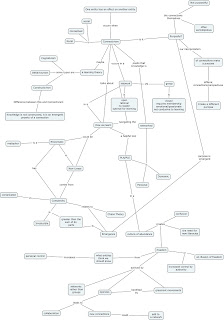Everything changes, so it is no surprise that the role of the Instructional Designer will also have to change to keep up with society. There is a vast amount of information available on the internet and increasing social connection possibilities. We are coming from the framework Martin Weller refers to as a Pedagogy of Abundance (2009).
I received a comment in one of my recent blog posts from
suifaijohnmak (2009) which stated, "In an learning ecology over the net, we are able to pursue our own interests with autonomy, and broaden our learning horizon as we engaged with different learning sources, experts, and media". I think this comment gets right to the heart of the matter in that there is so much in the way of content already out there and we have the potential now to easily access that.
This is completely different from reasoning for courses of the past. We are coming from the idea that knowledge or ideas reside in experts and those experts are few and far between. We needed to access them from either a recognized institution or a lecture or video that would be limited in distribution or accessibility.
The abundance of information also impacts the role of the student. No longer are students going to be passive learners. They need to take an active role in choosing the content of the course through the connections they make socially and also with the course material itself. This will inevitably have an impact on how an Instructional Designer will design a course.
I think the big change will come in
how courses are actually designed. If education is moving more towards philosophies such as constructivism, problem based learning, and connectivism, Instructional Designers need to be involved through out the course, not just designing a set course and leaving it to run. Formative evaluation will play a much larger role.
Students are going to become more in control of where they want the particular course to go based on their own interests. There will be less emphasis on required readings and topics and more freedom for students to bring their own materials to share and for them to choose which way the course unfolds.
I propose the metaphor of the Instructional Designer as the Gamemaster or GM, a term borrowed from role-playing. A GM may have a particular story line he/she would like to players to go down but ultimately a good GM knows that the players have to control the story. If they choose not to take the story bait the GM has left, the story line must change. I think the same will be true in designing a class in the future. There maybe a learning path that the designer wants the students to go down but based on the interests, connections and experience of the students they may end up going another way. The Instructional Designer will need to watch where the students are taking the course and make changes to the design to accommodate that learning path.
There are many possible impediments to this idea. The first is that this is not a very good system for keeping consistency in courses for accreditation purposes. We would have to completely change the idea of static course outlines. Instead we might be able to use more open descriptions about possibilities of materials the course might cover. However there would be no guarantee that each group within the same course would learn the same materials. In all likelihood they would have very different learning experiences as their groups would be different. I think this is evident in our current course CCK09. From what I have read it is significantly different from CCk08, even though it is the same course and the same topics are covered. We as the student of CCk09 have taken the course materials in a different direction based on our interests.
A lack of purposefulness is another potential impediment. The current idea is that education should take a student from point A to point B in a logical predictable manner. In my idea of the Instructional Designer as a Gamemaster this is not the case. There of course is a purpose for the course but the purpose is often more vague than people would like. The purpose is to make connections and forge your own learning paths as a group of students.
Currently my idea of the Instructional Designer as a Gamemaster is not practical for many courses at a K to 12 level, however I think courses like this could be experimented with at the post secondary level. The blending of the informal and formal learning models is a gradual process. There are more an more people within education everyday experimenting with personal learning networks and discussing ways to incorporate learner empowerment into their classes. I think the more we experiment with these ideas the closer we become to the learner directed course as an accepted model.
Works Cited
Weller, M.
A Pedagogy of Abundance (Elluminate Presentation). Retreived from CCK09 Recordings Wiki: http://ltc.umanitoba.ca/wiki/CCK09_Recordings#Week_9:_Net_Pedagogy_Conference
suifaijohnmak. (2009, November 20). My Position on Connectivism (Msg 1). Message posted to http://plaingillian.blogspot.com/2009/10/my-postition-on-connectivism.html
 To see a closer view of this map go here.
To see a closer view of this map go here. To see a closer view of this map go here.
To see a closer view of this map go here.